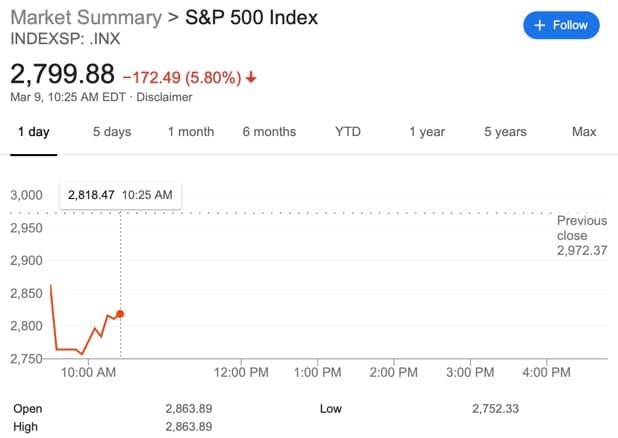What happens if the stock market crashes? Here’s what to do

Can you feel it? There's panic in the streets! We're in the middle of a stock market crash and the hysteria is starting again. As I write this, the S&P 500 is down six percent today -- and 17.3% off its record high of 3386.15 on February 19th.

Media outlets everywhere are sharing panicked headlines.
Hidden price increases at the grocery store
"Look at this," Kris said yesterday when she returned from grocery shopping. She held up two yogurt containers for me to see.

"So what?" I said. "Black cherry yogurt."
"Look closer," she said.
How to cancel COBRA insurance
In a recent article, I described what COBRA insurance is and my experiences obtaining it. One of the biggest complaints I had about COBRA was the sign-up process. Signing up for COBRA insurance had to be initiated by my employer, and it was a paper process to boot. This meant there was a lag between when I signed up and when I received proof of insurance.
Unfortunately, after wading through the sign-up process, the rest of my experience with COBRA didn't get any easier. A paper bill was mailed to me each month and I was supposed to send in my check. I couldn't find cancellation instructions anywhere on the documentation I received, and it wasn't possible to initiate the cancellation process online either.
Billing Mismatch was Just the Beginning
As I stated in my previous article, I needed COBRA only for the period between April 15 and May 1, when my insurance at my new employer was set to kick in.
Act surprised: Your wedding ring is a terrible investment
Divorce. It's an unattractive yet common end to a relatively high percentage of marriages in the U.S. In fact, as many as 50 percent of American marriages end this way, often leaving catastrophic personal and financial consequences that linger for years.
The division of assets. Alimony. Child Custody Issues. Who gets the Stuff? These are all things that must be dealt with during and after a divorce, whether one likes it or not. And the truth is, it isn't always pretty.
Unfortunately, my beloved brother recently learned all about divorce the hard way -- by actually going through one. And since he could no longer afford his giant house on his own, he had to move and sell most of his bigger stuff. I wanted to help in any way I could, so I offered to sell some of his bigger items on Craigslist and eBay. And within the timeframe of a few months, I sold his lawnmower and baby grand piano without too much hassle.
The cultural shift toward financial security
In the past few months, I've had a noteworthy number of conversations about the trend toward frugality. More of my friends seem interested in finding ways to save, I can't throw a rock at the Internet without hitting a money-saving "hack," and, during a job interview, I had a lengthy discussion about how "personal finance is now trendy."
Get Rich Slowly reader and money blogger Mrs. PoP noticed it too, and wrote about it on her blog:
"Recently I've begun to notice something a bit unusual. An interest in personal finance seems to be becoming more common, and dare I say, trendy… Maybe I'm just drawn to [friends'] comments because of our own interest in personal finance. But maybe, there's also a chance that personal finance -- in a non-gimmicky way -- is actually starting to be 'cool'." Continue reading...
More about...UncategorizedAn Experiment in Cheap Living (from 1872)
Continue reading...An Experiment in Cheap Living
Earlier this week, I shared some of the highlights from three years of GRS articles about saving money on food. Brett from The Art of Manliness, who knows that I collect old self-help books, sent me an excerpt from Dio Lewis's 1872 volume, Our Digestion, or, My Jolly Friend's Secret. Here Lewis describes his "experiment in cheap living", during which he spends just 54-1/4 cents for a week of food. This makes for some amusing reading. Enjoy!
It is now Saturday afternoon, and I will tell you in confidence, my dear reader, a little of my personal, private experience during the past week.
Do credit cards take from the poor and give to the rich?
My philosophy on credit cards has changed completely in the last five years. I've gone from anti-credit-card to pro-credit-card — but only for those who can use them responsibly. I think they're a great convenience, and I like getting cash back when I use mine.
But not everyone thinks this cash-back feature is a good thing. In fact, my inbox is a-flutter with folks who want me to comment on the recent credit-card study from the Consumer Payments Research Center. This study (which can be downloaded as a 810kb PDF from the Federal Reserve Bank of Boston) found that credit cards transfer wealth from the poor to the rich. How? Through fees and rewards programs.
From the abstract: Continue reading...
Can you be friends with rich people?
Continue reading...I wanted to title this post, "Can you be friends with people in decidedly different financial situations than you?" but that wasn't very catchy. (And I know: some of you ARE rich!)
But I was reading the acclaimed recent novel, "The Interestings," with my writer's craft book group (we discuss books based on writing analytics rather than whether characters and stories are likable). The book's main character is just ordinary, with an ordinary job and ordinary talents. But Jules has some extraordinary ("interesting") friends, friends that she met long ago at a summer camp for the arts.
Because Jules hasn't pursued her art as a career, and she probably wouldn't have made a ton of money at it in any case, she often finds herself terribly envious of her friends that have; notably, her friends whose talents have made them a huge financial success. (The male half of the couple seems to be loosely modeled off Matt Groening; his animated series quickly becomes huge and he's rich within months of winning a network deal.)
More about...FrugalityInvest in this: How I pick stocks
Continue reading...I've been doing what I call "investment banking" for a friend's company (I say it that way because the work I do is almost definitely not what you probably think of when you hear the term), and I get this question almost every day:
"So, I guess you know a lot about investing!"
Well, I know more than perhaps most people about investing. But, again, it's not what you think; I'm not doing any research into public companies, and I'm never, ever picking stocks professionally. Most of the work I do is with deals that have closed long before or deals that are only imaginary.
People ask me, often, "So, you're an investment banker? What should I invest in?" My response isn't what they're expecting, even though I think it's the best advice:
More about...InvestingSide gigs vs. day jobs
Continue reading...If you're in debt -- especially if you're in significant debt -- frugality will only get you so far. To really make a dent, you have to increase your income.
The option recommended most frequently on personal finance blogs I have read is freelancing or consulting on the side. Another option is a second job (usually hourly work of some kind).
However, side jobs aren't always the most effective way to increase your income. Freelance work is often sporadic and part-time/hourly work doesn't typically pay all that well. Time and mental energy are finite resources. Focusing too much on your side gig(s) may come at the cost of your career or interfere with your balance between time and money.
More about...Career